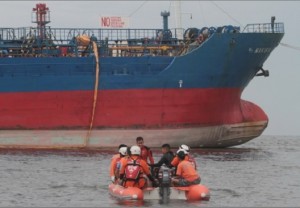
Philippine Coast Guard team check and get samples from the oil spill over the waters of Rosario, Cavite on Friday to the fuel tanker that has affected at least seven villages in the province. INQUIRER FILE PHOTO
MANILA, Philippines–The Philippine Coast Guard has yet to determine the source of the oil spill that turned parts of Manila Bay into red and adversely affected at least four Cavite coastal municipalities, contrary to published reports, according to the PCG spokesperson.
Commander Armand Balilo, also chief of the Coast Guard’s public affairs office, disclosed Sunday that their “divers would conduct another operation” to check if the diesel oil flowed out of a submerged pipeline of Petron Corp. or a tanker moored off the coast of Rosario, Cavite.
The initial reports that came out last Friday “have yet to be validated,” he told the INQUIRER.
Balilo also said the diesel oil that stained parts of Manila Bay had “started to evaporate.”
Commodore Joel Garcia, head of the Coast Guard Marine Environmental Command (MEC) had told reporters a leaking submarine pipeline of Petron caused the oil spill.
“Our personnel discovered a leak continuously flowing out of the submerged pipeline of Petron,” he said in a statement. Some MEC personnel insisted the Petron pipeline was really the source of the oil spill.
On Friday, Cavite Gov. Juanito Remulla observed “there were no evident signs of a fishkill, no damage to properties, although we are still waiting for the results of marine tests.”
He claimed only 90,000 liters of diesel oil spilled into the waters off the Cavite towns of Rosario, Naic, Tanza and Ternate.
But based on an aerial survey conducted by the Coast Guard, an estimated 500,000 liters of diesel spilled into the waters off the Southern Tagalog province.
Whether the oil spill will spread further to other areas depends on underwater currents and prevailing winds, according to Garcia.
The spill was first spotted about 3 kilometers off the Rosario coastline on Thursday afternoon.
Unlike a July 2010 incident when bunker fuel leaked from a ruptured Petron pipeline, diesel oil dilutes in water and evaporates faster, unlike bunker fuel that clings to the seabed, the MEC official explained.
Meanwhile, the left-leaning fisherfolk group Pambansang Lakas ng Kilusang Mamamalakaya ng Pilipinas (Pamalakaya) urged the government to “compel Petron to compensate the thousands of fishing families adversely affected by the oil spill.”
It also said “not a single centavo in taxpayers’ money should be spent on the oil spill cleanup operations. Petron should shoulder all the cleanup costs.”
For his part, Pamalakaya information officer Gerry Albert Corpuz described as a “whitewash” the Coast Guard investigation of the oil spill.
In a phone interview, he pointed out that “initially, the PCG pointed to the Petron pipeline as the source of the oil spill. Now, they are saying another thing.”
Corpuz claimed like the Coast Guard, Malacañang “wants to save Petron from its liabilities and accountabilities.” Balilo has denied Corpuz’ allegations against the command.